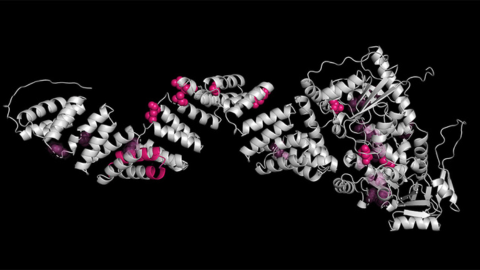Look at an exam, see a job application
How many times has this happened to you?
Question (2 points): Name two intermediates of the tricarboxylic, a.k.a. Krebs, cycle.
Response: Isocitrate, fumarate, malonyl-CoA
Instructor’s score: 1 point
Instructor’s comment: Isocitrate and fumarate are intermediates in the Krebs cycle, but malonyl-CoA is not. Two correct minus one incorrect response yields one net correct response.
Student's response: Why didn’t I get both points? I listed two correct intermediates, so the third one shouldn’t count.
Question (5 points): In the space provided, describe the molecular attributes of ethidium bromide that contribute to its ability to intercalate double-stranded DNA.
Answer: Ethidium bromide resembles a nucleotide base.
Instructor’s score: 2 points.
Instructor’s comment: While your statement is correct, you need to be more specific. For example, you might have explained how the planar shape, hydrophobicity and pi electron clouds on ethidium bromide contribute to its capacity to bind DNA.
Student's response: That’s what I meant. In class you said, “Ethidium bromide resembles a nucleotides base.” I’ve got it written in my notes. I don’t understand why you didn’t give me more points.
Question (2 points): Draw the structure of any amino acid containing a hydrophobic side chain:
Answer: Phenylalanine
Instructor’s score: 0.
Instructor’s comment: The question asked you to draw a structure.
Student’s response: But phenylalanine has a hydrophobic side chain. I deserve partial credit.
Everybody’s doing it
Many college students have learned that if they simply persist long enough in pressing their cases, a reasonable chance exists that they can wear down instructors until they concede a few more points. There are a number of ways that instructors deal with the segment of the student population for whom negotiating with the instructor has become a cornerstone of their strategy for academic success. Some avoid questions of this type, perhaps by relying exclusively on the multiple-choice format. Some simply award points for the mention of key words and phrases, ignoring whether the dots were connected correctly, the presence of incorrect information or statements, or failure to adhere to the directions given.
If you are an instructor who chooses to reward students whose answers are concise, correct and cogent, more likely than not you will encounter the argument that you are an outlier. A handful of students will protest that no other instructor includes the quality of overall construction of a response into his or her scoring rubric. Some students may plead that they don’t know how to answer your questions and ask what you are looking for with the expectation that you will reveal some secret formula. One or more may state with complete sincerity that they never have experienced difficulties in other classes. Unfortunately, all too often a look at their transcripts will bear out this claim.
This may sting a little
In the blink of an eye, today’s students will be filling out job applications rather than pop quizzes. They will be questioned during interviews. Both the substance and form of their responses will determine whether they will be able to gain admission to graduate or professional schools or employment and advancement in their chosen professions. One can justifiably argue that it is beyond the purview of today’s overburdened college faculty to take on the task of helping students learn how to answer questions effectively. However, we should also do our best to avoid practices that reward and reinforce poor question-answering skills.
While college classrooms are populated by many bright and self-motivated students, they also usually contain some whose focus is strictly on doing what is necessary to acquire a target grade. For these students, points are the only real motivator. Thus, if instructors award full credit for simply mentioning the right words or phrases, they provide little incentive for students to learn how to frame succinct, direct responses. Those students who habitually respond with disjointed rambles that include anything peripherally associated with the question probably will continue to do so regardless of any qualitative feedback the instructor may provide. If we give full credit to students who provide more responses than requested, there is no incentive for them to develop the depth of understanding and analytical skill needed to make and commit to a specific choice. If a student receives full credit when the instructor can see that the correct answer is in there somewhere, there is little incentive to develop a more extensive vocabulary or to do a better job of connecting the dots.
So next time you construct your scoring rubric for short-answer and essay questions, leave a few points to reward students for well-crafted responses and as an inducement to those students who need to develop or refine those skills. Take time when going over the exam in class to provide and analyze examples of responses that illustrate best practices. While some of your students may moan and groan, if you are clear about your rationale and expectations and consistent in your scoring, you may be surprised at the improvement.
Enjoy reading ASBMB Today?
Become a member to receive the print edition four times a year and the digital edition monthly.
Learn moreGet the latest from ASBMB Today
Enter your email address, and we’ll send you a weekly email with recent articles, interviews and more.
Latest in Careers
Careers highlights or most popular articles

Upcoming opportunities
Coming soon: ASBMB Breakthroughs webinar on biosynthesis and regulation of plant phenolic compounds and a Lipid Research Division seminar on membrane lipids.

Upcoming opportunities
Just added: New fellowship and research award opportunities. Friendly reminder: Submit your abstract for ASBMB's upcoming meetings.

Upcoming opportunities
Friendly reminder: May 12 is the early registration and oral abstract deadline for ASBMB's meeting on O-GlcNAcylation in health and disease.

Sketching, scribbling and scicomm
Graduate student Ari Paiz describes how her love of science and art blend to make her an effective science communicator.

Embrace your neurodivergence and flourish in college
This guide offers practical advice on setting yourself up for success — learn how to leverage campus resources, work with professors and embrace your strengths.

Upcoming opportunities
Apply for the ASBMB Interactive Mentoring Activities for Grantsmanship Enhancement grant writing workshop by April 15.

